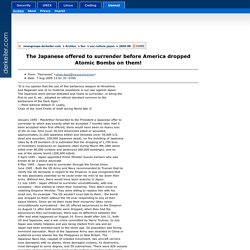

Carnegie Council for Ethics in International Affairs. Speaker: Ward Wilson, Monterey Institute of International Studies Transcript: Nuclear weapons shocked Japan into surrendering at the end of World War II—except they didn’t.
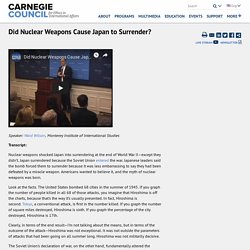
Japan surrendered because the Soviet Union entered the war. Japanese leaders said the bomb forced them to surrender because it was less embarrassing to say they had been defeated by a miracle weapon. The Real Reason America Used Nuclear Weapons Against Japan. It Was Not To End the War Or Save Lives. Like all Americans, I was taught that the U.S. dropped nuclear bombs on Hiroshima and Nagasaki in order to end WWII and save both American and Japanese lives.
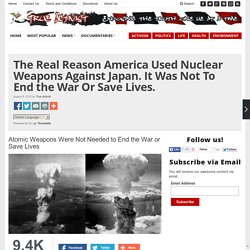
But most of the top American military officials at the time said otherwise. The U.S. Strategic Bombing Survey group, assigned by President Truman to study the air attacks on Japan, produced a report in July of 1946 that concluded (52-56): Surrender of Japan. On August 6, 1945, at 8:15 AM local time, the United States detonated an atomic bomb over the Japanese city of Hiroshima.
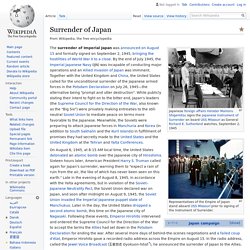
Sixteen hours later, American President Harry S. Was Hiroshima Necessary? Was Hiroshima Necessary?

Why the Atomic Bombings Could Have Been Avoided By Mark Weber. Japan Tried To Surrender After Midway Defeat. Real History, Japan, and Churchill's War. Real History, Japan, and Churchill's War. Top Secret-Ultra reports (NARS number: SRH 084, headed Russo-Japanese Relations) [My summary:] Early in June 1945 the Japanese Foreign Minister Shigenoria Togo advised Ambassador Sato in Moscow that it was a matter of 'the utmost urgency' to prevent Russia from entering the Pacific War.
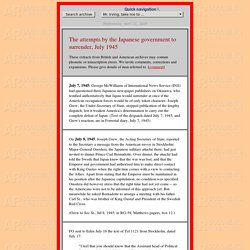
In the first two weeks of June, former prime minister Hirota conducted at Togo's request four conversations with Soviet ambassador Malik in Moscow (TOKYO?). This became plain from a June 28 message from Togo, from Tokyo to Moscow (See diplomatic summary 61195, dated July 3). Ambassador Malik did not however hold out much hope of providing the kind of friendly assistance that the Japanese were asking for. Two days later, on June 30, after a 7,000 ton TNT bombing raid, Foreign Minister Togo sent an extremely urgent despatch to Sato. He informed Tokyo on July 6, 'I believe that Molotov will leave for Berlin around the 10th and that it will be difficult for me to obtain an interview with him before that time.' Real History and the atomic bombing of Japan.
Real History, the Bomb, and the War against Japan. DAVID IRVING* reveals that the Allies were aware of Japanese attempts to quit the war before Hiroshima.
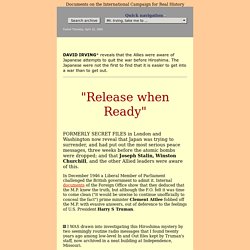
The Japanese were not the first to find that it is easier to get into a war than to get out. "Release when Ready" FORMERLY SECRET FILES in London and Washington now reveal that Japan was trying to surrender, and had put out the most serious peace messages, three weeks before the atomic bombs were dropped; and that Joseph Stalin, Winston Churchill, and the other Allied leaders were aware of this. In December 1946 a Liberal Member of Parliament challenged the British government to admit it. Internal documents of the Foreign Office show that they deduced that the M.P. knew the truth, but although the F.O. felt it was time to come clean ("it would be unwise to continue unofficially to conceal the fact") prime minister Clement Attlee fobbed off the M.P. with evasive answers, out of deference to the feelings of U.S.
OUT-105 itself was missing, and that intrigued me. Release whom or what? Real History, the Bomb, and the War against Japan. Real History, Japan, and Churchill's War. VJ - Hirohito. Real History, the Bomb, and the War against Japan. The REAL Reason America Used Nuclear Weapons Against Japan. Atomic Weapons Were Not Needed to End the War or Save Lives Like all Americans, I was taught that the U.S. dropped nuclear bombs on Hiroshima and Nagasaki in order to end WWII and save both American and Japanese lives.
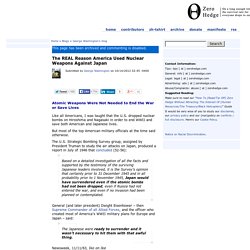
Was the Atomic Bombing of Japan Necessary? Few issues in American history - perhaps only slavery itself - are as charged as the dropping of the atomic bombs on Japan.
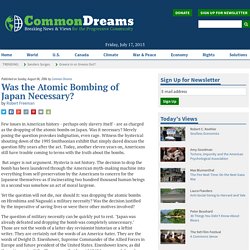
Was it necessary? Merely posing the question provokes indignation, even rage. Hiroshima Hoax: Japan's 'Wllingness to Surrender Before the Bomb. In the mid 1960's, a growing distrust of government and sympathy for the Vietnam protest movement among American intellectuals revitalized the antinuclear "ban the bomb" campaign, which few had taken very seriously before, and spurred criticism of the use of atomic weapons to end World War II.
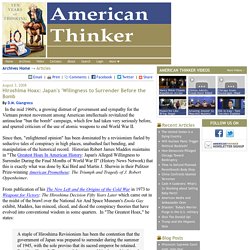
Since then, "enlightened opinion" has been dominated by a revisionism fueled by seductive tales of conspiracy in high places, unabashed fact bending, and manipulation of the historical record. Historian Robert James Maddox maintains in "The Greatest Hoax In American History: Japan's Alleged Willingness to Surrender During the Final Months of World War II" (History News Network) that this is exactly what was done by Kai Bird and Martin J.
Sherwin in their Pulitzer Prize-winning American Prometheus: The Triumph and Tragedy of J. Robert Oppenheimer. Unfortunately for the Pulitzer winners, the Hasegawa book does not support their central contention. Maddox relates that: This greatly amused Stanley L. 29.pdf. The Japanese offered to surrender before America dropped Atomic Bombs on them! "It is my opinion that the use of this barbarous weapon at Hiroshimaand Nagasaki was of no material assistance in our war against Japan.
